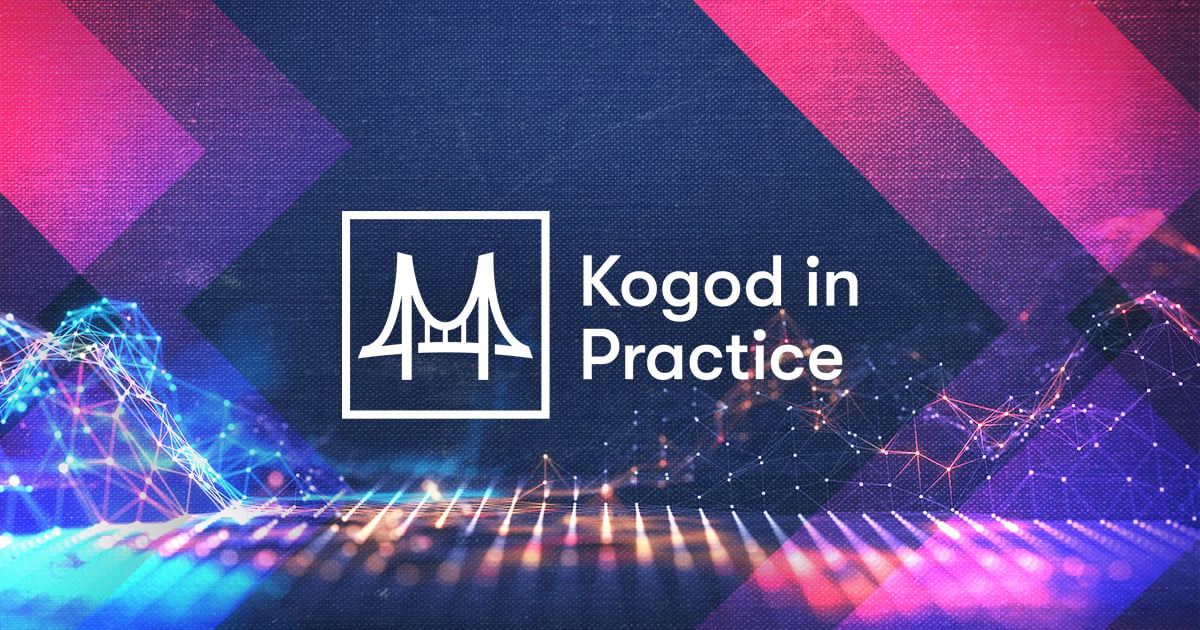
Darby Joyce
Content Marketing Coordinator
Before the Kogod School of Business announced its widespread adoption of artificial intelligence this past March, Kogod students Florence Vanderschueren (MS in Sustainability Management, KSB '24) and Justin Nolan (MBA, KSB '23) were already harnessing its capabilities to solve business problems. The pair were part of a team of five students who spent last fall working as consultants for a sustainable catering company to determine how AI could best be utilized in its growth. Along the way, they learned how to balance their client’s needs and goals, adapt to the rapidly changing uses for AI in business, and utilize best and grow their skills for their future careers.
“There are these very fine, subtle things you pick up from working with real clients, and you can only pick them up when you’re doing the work in the field,” said Nolan, an MBA student. “You have to really jump into your client’s world, and I think that’s not something that you can get in a classroom.”
Through Kogod in Practice, Nolan and Vanderschueren worked as pro bono consultants for HUNGRY Food Solutions, a multiservice platform for chefs, restaurants, and food delivery teams. HUNGRY was recently named among the DMV area’s fastest-growing businesses by the Washington Business Journal and sought a consulting team to help them develop tools to match that growth and continue serving their customers. Nolan and Vanderschueren were joined by Garrett Sheffels (MS in Analytics, KSB '23), Rishabh Kumar (MS in Analytics, KSB '24), and Queenal Ayaba (BS in Business Administration, KSB '24) to form a consulting team that would assist HUNGRY with meeting their growth goals, addressing pain points, and optimizing their existing practices. Kumar served as the team’s engagement manager, while the other four students took on consultant roles that encompassed duties such as researching AI opportunities, assessing the feasibility of each opportunity, and ensuring that their solutions were thoughtful and tailored to their client’s specific goals and scope of work.
“Since AI has very specific uses, we needed to make sure we were on track to actually add value in this case,” explained Vanderschueren, a student in Kogod’s MS in Sustainability Management program. “Our goal was to make sure that we were hitting pain points rather than just overfitting AI–adding it to operations that didn’t necessarily need it to be optimized.” With AI developing as rapidly as it is, it can be tempting to use it as much as possible, which makes it all the more important for teams like Vanderschueren’s to help companies avoid overcorrecting their issues with AI solutions that may not fit.
The question of utilizing the best AI options without overly relying on them was part of the appeal for Nolan. His role on the team included exploring what ideas could be implemented by HUNGRY’s in-house technology team, what would need to be outsourced, and how quickly either path would need to be taken to get results. Considering how quickly AI solutions can change, he enjoyed the challenge of keeping up.
AI is a technology where there’s a new, huge breakthrough every week, every day, every hour.”

Justin Nolan
MBA Student, Kogod School of Business
“When you combine that with the speed of change that happens in startup businesses, part of the challenge becomes how far we can forecast. You have to work quickly and be up to date with what’s going on,” Nolan said.
As assistant dean of experiential learning Angela Petras explained, the ability to adapt is key to a successful Kogod in Practice assignment. Petras puts the student teams together and serves as a professional lead who monitors the projects for quality control and student development. Still, she leaves the solutions themselves to the students.
“Each student brings their own skills and knowledge, and that’s the strength of these teams,” she said. “I don’t know how much training in AI anybody on the team had in the beginning, but each team tackles the needs of the client whether they’re familiar with the topic or not. They’ve got to figure it out.”
For her part, Vanderschueren had yet to gain prior AI experience when she began the project. As an engineer, she had spent some time with machine learning and automation. She had a general understanding of artificial intelligence, but the opportunity to learn more was part of the project’s draw.
“A lot of the motivating factors for the AI boom were also the reasons I was interested in this project because I hadn’t yet implemented it myself. It felt like a good way to get exposure,” she explained. “Since then, I’ve started using AI in my schoolwork in a very different way since I’m solving a different problem for myself than I was for the client.”
Nolan joined the team with prior AI experience and mentioned it as part of the reason he was interested in the project. Though it helped him conceptualize the wide variety of ways AI could support HUNGRY’s goals, he found that it was just as helpful to have teammates who would approach the same issue from different angles.
“The teams are put together in a way that gives them a well-rounded perspective. We were in different levels of school, and we had different levels of work experience,” he said. “You don’t need a full background in AI to be able to contribute to the team because we’re able to leverage different people’s strengths.”
In consulting, you’re learning along the way with your client in addition to providing them with a service.”

Angela Petras
Assistant Dean of Experiential Learning, Kogod in Practice
“These projects are truly just as hands-on as real-life experiences,” Petras agreed.
Now that AI has experienced a considerable boom at Kogod and beyond, the pro bono team is looking ahead at ways that it can be used to benefit clients and students alike. Petras already sees ways that artificial intelligence could simplify the logistical side of Kogod in Practice projects, from scheduling with clients across time zones to creating pros and cons lists for ideas before introducing them to the client. Meanwhile, Nolan noted how organizations are already using AI and bringing that back as a way for Kogod to better prepare students for their careers.
“There are businesses using AI in their initial stage interviews to look at candidates’ posture and where their eyes are looking to see if they’re reading something else,” he explained. “Since client meetings are often held on Zoom, maybe there’s a future possibility where Kogod uses the same technology to give feedback to students. That way, they can see from an AI’s point of view how they’re being looked at by the companies they’ll interview with one day.”
As the role of artificial intelligence at Kogod and within Kogod in Practice evolves, the people involved believe that the core goals of professional development and networking will stay the same. Vanderschueren, who was used to primarily working with other sustainability management students, now has friendships with her teammates that span programs.
“I feel like I have a stronger network now. Just earlier this semester, I called one of my old teammates because I wanted to pick his brain, and I can tell that’s a relationship I’ll have for the rest of my life,” she said. “It’s invaluable to know that I’ve built my network in that way.”
Petras feels the same way about every project she’s supported. Many of her pro bono students come back to manage additional projects or to participate in other experiential learning activities, and she wouldn’t have it any other way.
“Because you’ve spent so many hours together, you really establish long-term relationships,” she said. “I tell every student that they can reach out to me anytime because I really consider the relationships we build to be lifelong.”
Learn more about Kogod in Practice here.
